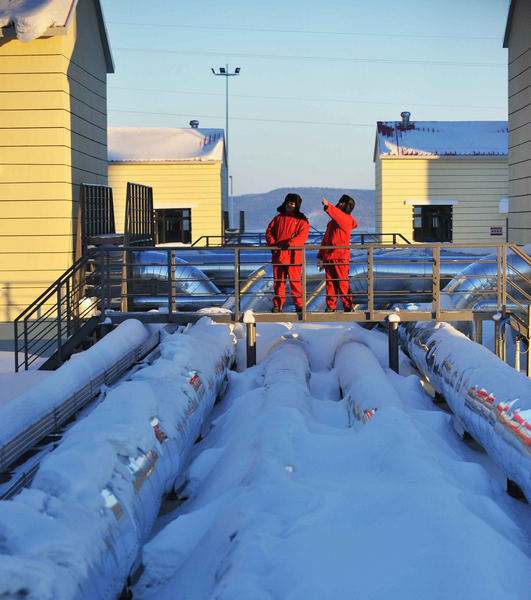Foreign and Military Affairs
Energy fuels booming bilateral relationship
By Zhou Yan (China Daily)
Updated: 2011-06-17 08:02
 |
Large Medium Small |
|
 Chinese workers inspect a crude oil pipeline at Mohe oil station on Jan 1, the day the China-Russia oil pipeline became operational. [Photo / Xinhua] |
BEIJING - Energy cooperation between China and Russia is strategically important and beneficial to both countries, but support from the two nations' top leaders is vital to its development, industry experts said.
China, which became the world's biggest energy consumer last year, provides a huge market for Russia - the top supplier of some of the world's major energy products, while Russia has also been making efforts to diversify its energy export destinations.
The two countries overcame some major obstacles in energy cooperation after a general agreement on the long-term delivery of natural gas through pipelines from Russia to China was reached on May 31 during Vice-Premier Wang Qishan's visit to Moscow.
The two countries' talks on natural gas started in 2006 between China National Petroleum Corporation and its Russian counterpart Gazprom.
According to the initial plan, Russia will supply 68 billion cubic meters of gas annually through two pipelines to China for at least 30 years.
China's apparent consumption of natural gas, which includes domestic production and imports, but excludes exports, reached about 100 billion cu m last year.
"China didn't take the chance to solve the price disparity issues during the financial crisis when prices were low. We hope the meeting between the two countries' top leaders will help accelerate the pace of negotiations and lead to major breakthroughs," Sheng said.
However, he said it's not easy to reach any conclusions when energy prices are rising.
An almost 1,000-kilometer oil pipeline linking China and Russia became operational on Jan 1.
It is scheduled to transport 15 million tons of crude oil from Russia to China annually for 20 years. Prior to the pipeline, Russian oil was transported to China by rail.
Sino-Russian cooperation in the energy sector, including petroleum, gas, coal, electricity, and renewable energy, still has big potential, Li Hui, China's ambassador to Russia, said.
"The two countries' cooperation will provide a cash infusion for Russia, while reducing China's heavy reliance on oil imports from the Middle East for the sake of energy security," said Lin Boqiang, director of the China Center for Energy Economics Research at Xiamen University.
Industry experts expected that China's foreign oil dependence ratio will grow to 60 percent after reaching a new high of 55 percent in 2010.

| 分享按钮 |



